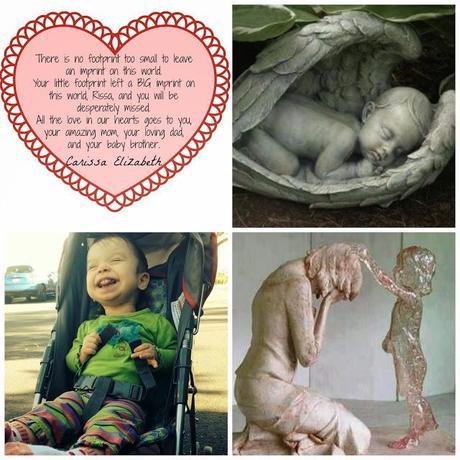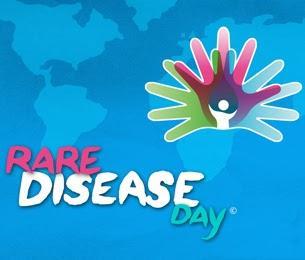Rissa (or Rissa Bear and Warrior Angel), as she was most often called, can be seen here with her family in these videos put together by her maternal grandpa:
As you can see, she was special. From my own perspective, though I never had the honor of meeting her in person, there was not a picture Jessica posted that didn't bring joy to my heart. Rissa's spirit was bigger than her petite body. She exuded happy and love.
 After her body grew weary and had to give up its fight, she left this world after only two short, but powerful years. Her parents tried to donate her organs, but due to a chromosome deletion, they were unable. They did donate her corneas, though, so that a part of her can live on in doing such good for another. Like I said, this is an amazing family.
After her body grew weary and had to give up its fight, she left this world after only two short, but powerful years. Her parents tried to donate her organs, but due to a chromosome deletion, they were unable. They did donate her corneas, though, so that a part of her can live on in doing such good for another. Like I said, this is an amazing family. Rissa's Celebration of Life will be held on Friday 28th, 2014 at 2:00pm at Eastlake Church in Chula Vista, CA.
The Quintanillas are asking that, in lieu of flowers, you consider making a donation in Rissa's name to Unique, The Rare Chromosome Disorder Support Group.
From them:
"People could be asked to make a check out, payable to Unique. Checks can be
sent to our US post box:
PO Box 594
Forest Park
Illinois
60130-0594
Alternatively, donations can be made in US Dollars securely through our
website at http://www.rarechromo.org/html/DonateNow.asp (scroll down to
'Make a Donation Online'). If those making donations could subsequently
email Jenny Knight, Unique's Family Support Officer at [email protected]
to tell her, she will ensure their donation has been received and that they
are thanked appropriately."
 Also and perhaps fittingly, February 28th happens to be World Rare Disease Day. Check the link to see what else you can do for people like precious Rissa.
Also and perhaps fittingly, February 28th happens to be World Rare Disease Day. Check the link to see what else you can do for people like precious Rissa.Lastly, I leave this information for those who feel as helpless as I do from The Compassionate Friends, a support organization for families whose children have passed:
How Can I Help?
A child has died. Regardless of the child’s age or the circumstances of death, as a person wishing to give support, you feel empty and helpless. What can you say or do that will ease the pain and help mend the hurts?
What Can You Do to Help?
There are no easy answers, no standard approaches that are universally helpful. There are no magic formulas that will make the pain go away. It is natural to feel helpless when the child of a friend or relative dies. Remember that showing your loving concern can be very comforting to a grieving family. Please don’t avoid them because you feel inadequate. Families are more likely to reach a healthy, positive resolution of their grief if they receive continuing support and understanding. The following suggestions may help you provide that support:
— Don’t try to find magic words that will take away the pain. There aren’t any. A hug, a touch, and a simple, “I’m so sorry,” offer real comfort and support.
— Don’t be afraid to cry. Your tears are a tribute to both child and parents. Yes, the parents may cry with you, but their tears can be a healthy release.
— Avoid saying, “I know how you feel.” It is very difficult to comprehend the depth of the loss when a child dies, and to say you do may seem presumptuous to the parents.
— Avoid using “It was God’s will” and other clichés that attempt to minimize or explain the death. Don’t try to find something positive in the child’s death, such as, “At least you have other children.” There are no words that make it all right that their child has died.
— Listen! Let them express the anger, the questions, the pain, the disbelief, and the guilt they may be experiencing. Understand that parents often have a need to talk about their child and the circumstances of the death over and over again. It may be helpful to encourage them to talk by asking a gentle question such as, “Can you tell me about it?”
— Avoid judgments of any kind. “You should . . .” or “You shouldn’t . . .” is not appropriate or helpful. Decisions and behaviors related to displaying or removing photographs, reliving the death, idealizing the child, or expressing anger, depression, or guilt may appear extreme in many cases. These behavior patterns are normal, particularly in the first years following the child’s death.
— Be aware that, for parents with religious convictions, their child’s death may raise serious questions about God’s role in this event. Do not presume to offer answers. If the parents raise the issue, it would be better to listen and allow them to explore their own feelings. They will need to arrive at an individual philosophy about this.
— Be there. Run errands, help with household chores, provide child care, and help in whatever way is needed. Don’t say, “Call me if there is anything I can do.” That call will probably never come. Be aware of what needs to be done and offer to do specific tasks.
— Give special attention to surviving children. They are hurt, confused, and often ignored. Don’t assume they are not hurting because they do not express their feelings. Many times siblings will suppress their grief to avoid adding to their parents’ pain. Talk to them and acknowledge their loss.
— Mention the name of the child who has died. Don’t fear that talking about the child will cause the parents additional pain. The opposite is usually true. Using the child’s name lets parents know that they are not alone in remembering their child.
— Be patient. Understand that grieving family members respond differently to their pain. Some verbalize, others may seem unable or unwilling to talk, some withdraw, and others strike out angrily.
— Sharing fond memories of the child through statements such as “I remember when she . . .” or “He had a wonderful gift for . . .” can be reassuring to parents and show that you appreciated their child and are aware of their sense of loss. Relate amusing anecdotes about the child. Don’t be afraid of laughter. It helps to heal the hurt.
— Remember the family on important days such as the child’s birthday and death anniversaries. Send a card, call, or visit. Let them know you remember, too.
— Gently encourage a return to outside activities. Suggest a lunch or movie as relief from the isolation of grief. If your invitation is declined, don’t give up! Ask again and again, if necessary. The third or fourth time you call may be just the day that an outing would be welcome if someone took the initiative.
— There is no standard timetable for recovery. Grief usually lasts far longer than anyone expects. Encourage bereaved families to be patient with themselves. They often hear, “Get on with your life; it’s time you got over this!” Those demands are unfair and unrealistic. When parents express concern about being tired, depressed, angry, tearful, unable to concentrate, or are unwilling to get back into life’s routines, reassure them that grief work takes time and that they may be expecting too much of themselves too soon.
— Be sensitive to the changes a bereaved family experiences. Family members will adopt new behaviors and roles as they learn to live without the child. This is a painful and lengthy process. Don’t expect your friends to be unchanged by this experience.
— Refer a grieving family to The Compassionate Friends, which has more than 640 U.S. chapters providing friendship, understanding, and hope to bereaved families. Online, many types of support are available including TCF's comprehensive website at www.compassionatefriends.org (that includes an Online Support Community), as well as TCF's Facebook and Twitter pages. Call TCF's National Office toll-free at 877-969-0010 for chapter referral information and to request a no-charge customized bereavement packet.
— Continue your contact with the family. Grief does not end at the funeral or on the first anniversary. Stay in touch often, and in conversation, as easily as you would mention any other member of the family, don’t forget to mention the name of the child who died.
With that, streaming tears, and a broken heart, I say farewell Rissa. You are already terribly missed.

